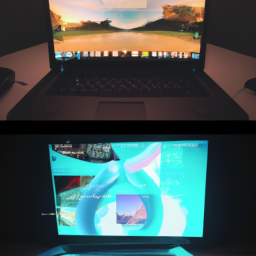So, you’re in the market for a laptop screen extender? That’s great! It can really enhance your productivity and make multitasking a breeze. But before you make a purchase, there are a few factors you should consider to ensure you get the right one for your needs.
First and foremost, you’ll want to think about the size and resolution of the extender. The size should be compatible with your laptop screen, so it seamlessly integrates without any issues. As for the resolution, you’ll want to make sure it matches or exceeds the resolution of your laptop screen. This will ensure that the images and text displayed on the extender are clear and sharp.
Another important factor to consider is the connectivity options. Most laptop screen extenders connect to your laptop via USB or HDMI. You’ll want to check your laptop’s ports to ensure compatibility with the extender you’re considering. Additionally, some extenders offer wireless connectivity options, which can be convenient if you prefer a cable-free setup.
Lastly, consider your intended use for the extender. Are you mainly using it for work and need it to display spreadsheets and documents? Or are you a gamer looking for a second screen for a more immersive gaming experience? Knowing how you plan to use the extender will help you determine if you need additional features like a high refresh rate or color accuracy.
These are just a few factors to consider when buying a laptop screen extender. In our upcoming article, we’ll go into more detail on each of these factors and provide you with more tips to help you make an informed decision. Stay tuned! When it comes to expanding the display of your laptop, a screen extender can be a great solution. Whether you need more screen real estate for work, gaming, or entertainment purposes, a laptop screen extender can enhance your overall computing experience. However, with so many options available in the market, it can be overwhelming to choose the right one for your needs. In this article, we will explore the factors that you should consider when buying a laptop screen extender.
Types of Laptop Screen Extenders
Before delving into the specific factors, let’s first understand the different types of laptop screen extenders available in the market.
Portable Screen Extenders
These screen extenders are lightweight and compact, which makes them perfect for users who are constantly on the go. Portable screen extenders are usually powered by USB and can easily be connected to your laptop. They provide an additional display that can significantly increase your productivity on-the-go.
Desktop Screen Extenders
If portability is not your primary concern, desktop screen extenders offer a larger display and often come with stand-alone bases. These extenders are designed to be placed on your desk for an extended period of time. They provide a more immersive experience and are ideal for tasks that require a larger screen, such as video editing or graphic design.
Wireless Screen Extenders
Wireless screen extenders eliminate the clutter of cables and offer more flexibility in terms of placement. These extenders connect to your laptop via Wi-Fi or Bluetooth and can be conveniently positioned anywhere within the wireless range. While they may be slightly more expensive than their wired counterparts, wireless screen extenders provide the convenience of a wire-free setup.
Screen Size and Resolution
One of the most important factors to consider when buying a laptop screen extender is the screen size and resolution. The screen size determines how much additional display area you will have, while the resolution determines the clarity and sharpness of the image.
Compatibility with Laptop
Before purchasing a screen extender, it is crucial to ensure that it is compatible with your laptop. Check the specifications of both your laptop and the screen extender to verify if they are compatible in terms of connectivity and compatibility. Some screen extenders may require specific software or drivers to be installed on your laptop for proper functionality.
Optimal Screen Size
The optimal screen size depends on your personal preferences and requirements. Consider the tasks you will be performing on the extended display and choose a size that suits your needs. For basic tasks like web browsing and document editing, a smaller screen extender may suffice. However, for tasks that require more screen real estate, such as video editing or gaming, a larger screen extender would be more appropriate.
Resolution and Display Quality
In addition to screen size, the resolution of the screen extender is equally important. A higher resolution ensures a crisper and more detailed image. Look for a screen extender with a high pixel density for a better visual experience. Additionally, factors such as color accuracy, brightness levels, and viewing angles should be considered for optimal display quality.
Connectivity Options
The connectivity options of a laptop screen extender play a crucial role in determining its usability and convenience.
Wired Connectivity
Wired screen extenders connect to your laptop via cables, commonly using HDMI, DisplayPort, or USB. HDMI and DisplayPort connections offer high-quality video output, while USB connections provide portability and convenience. Ensure that your laptop has the necessary ports for the chosen screen extender and consider the cable length if you plan to position the extender at a distance from your laptop.
Wireless Connectivity
Wireless screen extenders use Wi-Fi or Bluetooth to connect to your laptop, allowing for a wire-free setup. This provides more flexibility in terms of positioning and eliminates the need for cables. However, it is important to note that wireless screen extenders may introduce a slight delay or lag in the display output due to the wireless connection. Choose a wireless extender with a stable and reliable connection to minimize any potential issues.
Ease of Setup
Consider the ease of setup when choosing a laptop screen extender. Some extenders require complex software installations and configurations, while others offer plug-and-play functionality. If you prefer a hassle-free setup, look for extenders that are easy to install and configure without the need for additional software.
Adjustability and Ergonomics
The adjustability and ergonomics of a laptop screen extender can greatly impact your comfort and productivity.
Adjustable Viewing Angles
An extender with adjustable viewing angles allows you to optimize the screen position based on your seating arrangement and personal preferences. Look for extenders that offer tilting and swiveling capabilities for maximum flexibility.
Height and Tilt Adjustability
Ergonomics should be a key consideration when choosing a laptop screen extender. Look for an extender that offers height and tilt adjustability to ensure that the screen is at eye level, reducing strain on your neck and back. This will help maintain a comfortable and healthy posture during prolonged usage.
Ergonomic Design
Consider the overall design and build quality of the screen extender. Look for features such as a sturdy stand or mount, cable management options, and a sleek design that complements your laptop setup. An ergonomic design not only enhances the aesthetics of your workspace but also improves usability and functionality.
Additional Features
Some laptop screen extenders offer additional features that can enhance your computing experience.
Built-in Speakers
If audio is an important aspect of your work or entertainment setup, consider a screen extender with built-in speakers. This eliminates the need for separate speakers and reduces clutter on your desk.
USB Ports
Additional USB ports on the screen extender can come in handy for connecting peripherals such as keyboards, mice, or external storage devices. This saves you from the hassle of reaching for the ports on your laptop, especially if the extender is positioned further away.
Touchscreen Functionality
Certain screen extenders come with touchscreen capabilities, allowing you to interact with the extended display directly. This can be useful for tasks that benefit from touch input, such as digital art or presentations.
Compatibility with Operating Systems
Ensure that the screen extender you choose is compatible with your operating system.
Windows
Most screen extenders are compatible with Windows operating systems. However, it is always recommended to check the product specifications and compatibility requirements to ensure seamless integration.
Mac OS
If you are a Mac user, make sure the screen extender you choose is specifically designed and compatible with Mac OS. While most extenders support Mac OS, double-checking compatibility will help avoid any potential compatibility issues.
Linux
For Linux users, compatibility can vary depending on the specific distribution and hardware configuration. It is advisable to research and check compatibility with your specific Linux setup before making a purchase.
Price Range and Budget
Consider your budget when choosing a laptop screen extender. Determine how much you are willing to invest in a screen extender and compare the options available within your price range.
Consider Budget
Set a realistic budget based on your requirements and prioritize the features that are most important to you. Visualize the long-term value that the screen extender will bring to your computing experience and make a decision accordingly.
Value for Money
While it is essential to consider your budget, it is equally important to assess the value for money offered by the screen extender. Consider factors such as build quality, display technology, additional features, and warranty coverage to determine if the price is justified.
Price vs Features
Evaluate the features offered by different screen extenders within your budget range. Compare factors such as screen size, resolution, connectivity options, and adjustability to find the best balance between price and features that suits your needs.
Brand and Customer Reviews
Choosing a reputable brand and considering customer reviews can provide insights into the reliability and quality of a laptop screen extender.
Reputable Brands
Opt for screen extenders from reputable brands that have a proven track record in producing reliable and high-quality products. Well-known brands often provide better customer support and warranty coverage.
Customer Ratings and Reviews
Reading customer ratings and reviews can give you an idea of the real-world performance and user experiences with a particular screen extender. Look for consistent positive feedback and consider the overall sentiment of the reviews before making a decision.
Reliability and Durability
Consider the reliability and durability of the screen extender, especially if you plan to use it extensively or carry it during travel. Look for extenders made with high-quality materials and ensure that they are built to withstand daily wear and tear.
Warranty and After-sales Support
The warranty and after-sales support provided by the manufacturer should not be overlooked.
Length of Warranty
Check the length of warranty offered by the manufacturer. A longer warranty period indicates the manufacturer’s confidence in the product’s quality and provides you with peace of mind against any potential defects or malfunctions.
Technical Support
Ensure that the manufacturer provides reliable technical support in case you encounter any issues or need assistance with the screen extender. Look for a brand with a responsive customer support team that can address your queries or concerns promptly.
Return Policy
Familiarize yourself with the return policy of the manufacturer or retailer. This will help safeguard your purchase in the event that you are not satisfied with the performance or functionality of the screen extender.
Conclusion
When buying a laptop screen extender, various factors should be taken into consideration. Consider the type of extender, screen size and resolution, connectivity options, adjustability and ergonomics, additional features, compatibility with operating systems, price range and budget, brand reputation and customer reviews, as well as warranty and after-sales support. By carefully considering these factors and understanding your personal preferences and requirements, you can make an informed decision that best suits your needs. Enhance your computing experience with a laptop screen extender that provides the added display space you desire, whether you are a professional, gamer, or simply in need of a larger work area.



